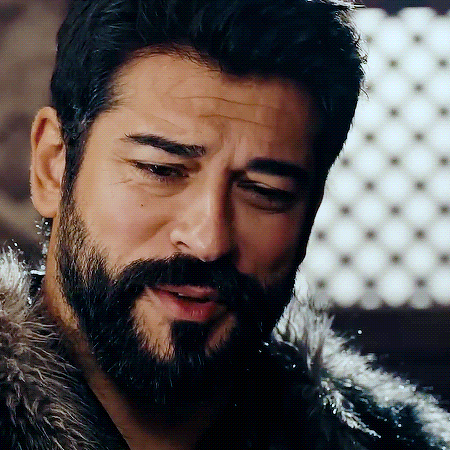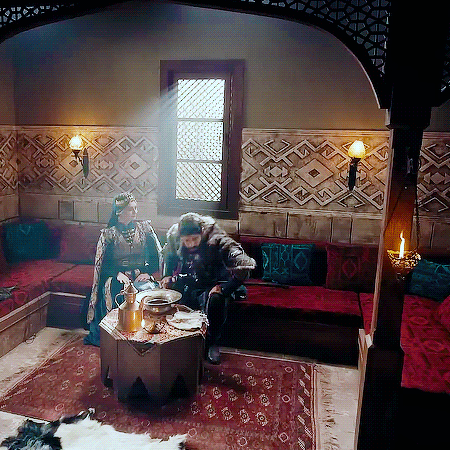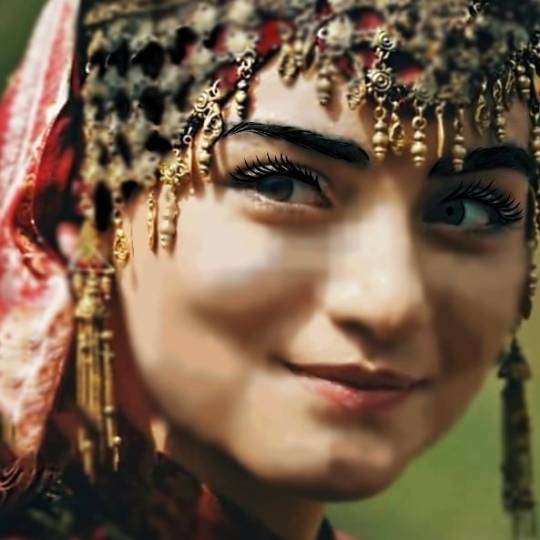#bala x osman
Text





Özge Törer as Bala Hatun and Burak Özçivit as Osman Kuruluş:Osman Episode 128
Requested by @balahatunandmalhun
#kurulus: osman#kurulus osman#bala hatun#özge törer#osman bey#osman#burak özçivit#bala x osman#stuff:mine#turkish drama#perioddramaedit#perioddramagif#perioddramasource#gifshistorical#kurulusosmanedit
61 notes
·
View notes
Text
The Most Beautiful Thing In The World Is Love. - Chapter 2

Book: Dracula A Love Story
Pairing: Mehmed x Lale / Mehmed x MC
Characters: Şehzade Mehmed, Lale Hatun, Sultan Murad,..
Important note:
In episode 5 of Dracula a love story season 4, Sultan Murad tells the story of Osman who marries Sheikh Edebali's daugher.
The names of Osman's wives were mixed up, as they refered to the Sheikh's daughter as "Malhun Hatun", when her name was "Rabia Bala Hatun".
Malhun Hatun was indeed Osman's first wife and mother to the future sultan Orhan, and Rabia Bala Hatun wed Osman later on, becoming his second wife. Together they will have only one son, Alaeddin, who will become Grand Vizir.
While I do not like discrepancy, I have decided to keep Murad's quote as it was in the game, so as not confuse my fellow players.
Still I wanted to provide good informations about Historical figures.
Chapter 2:
The past few days had been most tiresome for the troops. At first, they rejoiced at the surprise that their arrival made on the Hungarians. At loss, they didn’t have the time to gather enough supplies to withstand a siege. But then, both sides started to stall, neither wishing to engage the fight. This could soon cause a problem, as more reinforcements might arrive from Europe; and then, the Ottomans would be the ones besieged, surrounded by all parts.
These thoughts were occupying Mehmed’s spirit as he regained his tent, the second night on the field. While the servants were preparing everything for his ablutions, he continued his train of thoughts, eyeing them absentmindedly.
It was a good thing that the Hungarians suggested a duel: their victory lifted the spirit of the Ottoman troops, and now the Mehter march could be heard throughout the entire valley. This military music would always remind their enemy that the mighty Ottoman army was close, breathing down their neck, and ready to claim their victory on those lands, as they did on many other lands before. Yet something was bothering the young prince: Aslan. He had chosen him for his excellent swordman’s skills, but his father had seemed too happy about his victory.
Mehmed took out his caftan, then his shirt, letting his fingers run along the scar on his lower abdomen. ‘Yes, Aslan is a good fighter’ he thought ‘but even good fighters can let their guard down once in a while.’ He stared at the former slash wound with a thin smile, thoughts of Aslan gradually fading away to be replaced by more pleasant ones. He tried to imagine how the days passed in the palace, while they were away. Her slender figure strolling through the gardens in an attempt to pass the time; maybe the sketches she would draw of the beautiful sceneries. Would she sit on the bench by the pound, in the very gardens he designed, to read some treaties? Or would she write letters, only to throw them into the fireplace in her quarters, unsatisfied with the words she would have chosen? Was she praying for them?
A shadow appeared on Mehmed’s features as he thought. She would be praying for her friends, that was for sure. And write to them as well. His breathing became harsher. But for him, would she pray for him? Would her heart be sized in angst as the days pass without hearing any news from him?
The young man splashed some cool water on his face, not only to wash the sweat and dirt of the day, but also to wash away these thoughts. Thoughts of Lale would make him travel from Cennet to Cehennem in the blink of an eye; she would torment him without even uttering a word, even now, so far away from him.
He quickly finished his ablutions then hurried to dress when his father got announced by one of his personal guards, before welcoming him with a deep and respectful bow.
The Sultan seemed very pleased with the events of the day, and immediately started to engage with his son about them. Mehmed humoured him by replying from time to time, and by agreeing on Aslan’s victory being a sign of Destiny. But his thoughts remained elsewhere, on Edirne, on her.
“Do you recall how everyone laughed at your dream of conquering Constantinople?” his father asked with a thin smile. “As it would turn out, they were mistaken.” This question alone brought Mehmed’s attention back to his father who, noticing the change in his son’s features, continued with a knowing smile. “You’ve surely heard about our empire’s founder, Osman the First…”
Osman Gazi, son of Ertuğrul; founder of the Ottoman Beylik, a small principality in the region of Bithynia that would soon expand into a magnificent Empire to which he would give his name, as well as the Dynasty that his descendants would create.
Of course Mehmed had heard of him; Osman turned a small principality into a flourishing empire, their empire.
“Little was known about him before. But some old documents were recently discovered.” His father continued. “An old epic poem, dating from the time of Osman. In it were described two of his prophetic dreams.”
“What were the dreams?” Mehmed asked with renewed fervour. “Please tell me.”.
Sultan Murad then started his tale of Osman studying under the wisdom of Sheikh Edebali, and falling in love with the Sheikh’s daughter, Malhun Hatun.
Osman wished to marry her, and so, asked Sheikh Edebali for his daughter’s hand. But the Sheikh, judging young Osman unworthy of his daughter, refused.
Osman kept on studying with Sheikh Edebali, and one night when he was sleeping at Sheikh Edebali’s house, he had a dream.
Osman saw himself and his host reposing near each other. From the bosom of Edebali rose the full moon, and inclining towards the bosom of Osman it sank upon it, and was lost to sight. After that a goodly tree sprang forth, which grew in beauty and in strength, ever greater and greater.
Still did the embracing verdure of its boughs and branches cast an ampler and an ampler shade, until they canopied the extreme horizon of the three parts of the world. Under the tree stood four mountains, which he knew to be Caucasus, Atlas, Taurus, and Haemus. These mountains were the four columns that seemed to support the dome of the foliage of the sacred tree with which the earth was now centered. From the roots of the tree gushed forth four rivers, the Tigris, the Euphrates, the Danube, and the Nile.
Tall ships and barks innumerable were on the waters. The fields were heavy with harvest. The mountain sides were clothed with forests. Thence in exulting and fertilizing abundance sprang fountains and rivulets that gurgled through thickets of the cypress and the rose. In the valleys glittered stately cities, with domes and cupolas, with pyramids and obelisks, with minarets and towers.
The Crescent shone on their summits: from their galleries sounded the Muezzin’s call to prayer. That sound was mingled with the sweet voices of a thousand nightingales, and with the prattling of countless parrots of every hue. Every kind of singing bird was there. The winged multitude warbled and flitted around beneath the fresh living roof of the interlacing branches of the all-overarching tree; and every leaf of that tree was in shape like unto a scimitar.
Suddenly there arose a mighty wind, and turned the points of the sword-leaves towards the various cities of the world, but especially towards Constantinople. That city, placed at the junction of two seas and two continents, seemed like a diamond set between two sapphires and two emeralds, to form the most precious stone in a ring of universal empire. Osman thought that he was in the act of placing that visional ring on his finger, when he awoke.
“Osman told the Sheik everything about these dreams. Sheik Edebali was amazed and interpreted them as prophecies. The first part of the dream predicted that Osman would establish a vast empire, and his descendants would rule it. The second predicted that one of his descendants would conquer Constantinople.
After this” concluded the Sultan, “Sheikh Edebali allowed his daughter to marry Osman.” Murad eyed his son with a serious expression on his face.
“If we win this war, Mehmed… You, my son, have every opportunity to fulfil the second prophecy.” This was beyond anything Mehmed had ever hoped to hear from his father’s mouth. Finally, he was seeing him for who he truly was.
“I would do anything for that!” Mehmed heard himself reply immediately, his pulse accelerating at the idea that his father could finally envision such a future for him.
“But remember, Osman was not alone. If it hadn’t been for his wise wife, things could have turned out differently. She was an exceptional girl of remarkable intelligence and a pure soul. She had a significant influence on him and helped him become who he was.”
As his father spoke, Mehmed reflected upon an exceptional girl, who too, helped him change and become who he truly intended to be. The Sultan’s praises for Malhun Hatun echoed in Mehmed’s mind as praises fitted for Lale.
“I hope you’re lucky enough to find a woman like her… Intelligent and pure-hearted, proud and noble. Not just by blood, but in every way.” Mehmed held his breath as he heard these words. He barely dared to move a muscle. Had he fallen asleep and this was just a dream? Could it be true? He looked away to regain some composure, but could not hide the gleam in his eyes. This idea was risky, but he couldn’t keep quiet about it any longer.
“Someone like Lale Hatun.” He finally turned toward his father, his gaze filled with hidden hope and his heart racing in his chest with excitement. Oh he could imagine her already, in her beautiful red wedding bindalli. Finally he had taken a step toward the dream that had long tormented him: marrying Lale.
But the expression on the Sultan’s face announced to Mehmed that these hopes were not shared by his father. Like a man waiting for his death sentence, he watched as his father nimbled his lower lip, annoyed.
“Mehmed, I didn’t expect such a thing to cross your mind. After what happened between the two of you in your youth, I thought you knew there could be no talk of your wedding.”
And just like this, his father had crushed his hopes once more. He felt like the earth had opened underneath his feet; like fire was burning him alive.
No matter how much his father would praise his strength, knowledge and battle skill; he still deemed him unworthy. Once more, he was a little boy pushed away by his father; unloved by him. Unrespected by anyone.
As if things weren’t already terrible enough, his father deemed it wise to add fuel to the fire.
“Besides, I already have a groom in mind for Lale.”
The rest of the conversation seemed like a far away echo that would resonate endlessly in Mehmed’s mind.
Lale, his Lale, promised to Aslan. Aslan, a slave, was deemed more worthy of Lale than the Sultan’s own son! Mehmed clenched onto his collar, trying to grasp some air. But as soon as his father left the tent, his anger could no longer be contained.
Wounded, he trashed the coffee table, the chests and all the furniture within his reach. Tears of rage and pain now ran on his cheeks as he unleashed this maelstrom of emotions. The pain was so deep that he wished to tear his treacherous heart from his chest to stop the hurting.
He hit his chest repeatedly, until, out of breath, he sat on his bed; clenching his head in his hands.
As he rose his face from his hands, his breathing still uneven, he finally noticed something amidst the chaos that was now his tent. A few metres away from him, out of a silken bundle laying on the thick carpet covering the ground, was something resembling a shirt.
Frowning, the Şehzade slowly rose from his seat and knelt in front of it. Testing the material between his index and thumb, he uncovered the rest of the shirt with the other hand.
With wide-opened eyes, Mehmed realised that this was no ordinary shirt. And the scent that it carried was all too dear for him not to understand whom the shirt was from.
He religiously unfolded it, and while tracing the embroidery with his fingers, read the inscriptions.
“ We have opened up a clear victory for you.
so Allah may forgive you for any offence of yours you have committed previously or whatever you may do later on, complete His favour toward you and guide you along a Straight Road.
And that Allah may aid you with a mighty victory.”
There were more of it, embroidered on the talismanic shirt. The 29 verses of the Surat Al Fath were written, in golden threads, on his shirt. But Mehmed would discover them later, as he would read them studiously before deciding to wear the shirt for the rest of the night, and the following day, for the battle.
But for now, all he could think of was Lale, patiently threading every single word into a shirt, to protect him.
His heart, that seemed wounded to death just a moment ago, was now beating with such joy as if it could jump out of his chest. And through the moisture now settling in his eyes, Mehmed smiled. A sincere and hopeful smile.
So he was still worthy, after all.
---------
notes: Cennet and Cehennem are the Turkish words for Heaven and Hell.
https://en-academic.com/dic.nsf/enwiki/11865382 (I copied the legend of Osman's dream from there).
https://quran.com/48?translations=131%2C85 ( Surat Al Fath 48:1 - 48:3)
11 notes
·
View notes
Text
Bala hatun için ipis paint x uygulamasi ile çizim çok uzun sürdü ama sonunda ol... Kuruluş Osman
Bala hatun için ipis paint x uygulamasi ile çizim çok uzun sürdü ama sonunda ol… Kuruluş Osman

View On WordPress
0 notes